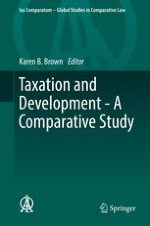Abstract
Portugal taxes its resident companies on worldwide income and, in order to prevent double taxation, allows a credit for foreign taxes paid to another jurisdiction. An exemption from Portuguese tax (participation exemption) is provided for dividends paid by a foreign subsidiary resident in the EU or EEA. This participation exemption has been extended to companies resident in former Portuguese colonies in Africa. Portugal has enacted a number of provisions designed to discourage investment in tax havens or similar regimes. It is party to a number of multilateral and bilateral exchange of information agreements which are designed to promote administrative cooperation. Until the end of 2020, there are special tax incentives for investment in certain industrial sectors, including manufacturing and mining, tourism, information technology, research and development, energy and telecommunications.
Synopsis
Portugal taxes its resident companies on worldwide income, allowing a credit for foreign taxes paid to another jurisdiction (on a country-by-country basis). The credit is limited to the Portuguese tax on the foreign income in question.
Nonresidents are taxed on income either from Portuguese sources or arising out of activities through a Portuguese permanent establishment.
There is a participation exemption for dividends paid to a company resident in Portugal by a foreign subsidiary if the entity is resident in the EU or EEA. In this case, both the payer of the dividend and the recipient must qualify under the EU Parent-Subsidiary Directive.
Portugal has enacted a number of provisions designed to discourage investment in tax havens or other “clearly more favorable tax regimes.” Tax havens are either countries listed by the Ministry of Finance or countries in which income is exempted from tax or subject to a tax liability less than 60 % of what the liability would have been in Portugal. The investment disincentives include: controlled foreign corporation (CFC) rules taxing profits of tax havens to Portuguese shareholders, a special transfer pricing regime, non-deductibility of payments (and a higher rate of taxation on payments) made to persons or companies in tax havens, and denial of contractual investment incentives.
After a phase two review by the OECD’s Global Tax Forum found Portugal mostly compliant with transparency and exchange of information guidelines, changes to two special tax regimes were made. One regime, the Free Zones of Santa Maria, Azores, was abolished. The other in Madeira is scheduled to terminate.
Portugal is party to a number of multilateral and bilateral exchange of information agreements, either contained in tax treaties or in simplified form. The simplified agreements (involving only procedures for automatic and spontaneous exchange) have been signed with Span, Brazil, Cape Verde, and Mozambique and involved strengthened procedures for administrative cooperation. It has adopted the OECD’s Common Reporting Standard and it is a party to a FATCA agreement with the U.S., signed in August, 2015, which is under implementation.
A special tax regime for former Portuguese colonies in Africa applies. Companies resident in these countries are treated as domestic for the purpose of the participation exemption available only for dividends between domestic corporations (unless they are EU or EEA member states). This exempts dividends paid by these companies to Portuguese residents from Portuguese tax.
In order to attract investment in Portugal (both domestic and foreign), a special regime allowing for “tax-incentive” contracts is in place. These contracts apply to specified investments before the end of 2020 (manufacturing and mining, tourism, computers and related services, agriculture, research and development, information technology, environment, energy and telecommunications). They may grant a tax credit for a specified level of investment in Portugal, a participation exemption for dividends received from foreign corporations, exemption from stamp duties and property taxes, and extra R & D deductions.
The corporate tax rate in Portugal is 25 %, with a surtax for corporations with taxable income in excess of specified levels. Corporations not involved in commercial, industrial, or agricultural activity are taxed at the rate of 21.5 %.
Withholding tax on Portuguese source income paid to nonresidents is 21 %, but this may elevate to 35 % if the payment is to entities located in tax havens.
Portugal is a party to numerous bilateral and multilateral trade or investment agreements.
